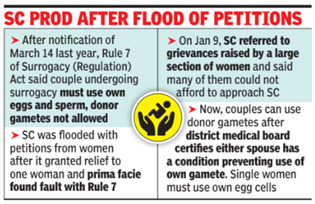Government Allows Donor Egg & Sperm in Surrogacy
23-02-2024
10:15 AM
1 min read

What’s in Today’s Article?
- Why in the News?
- About Surrogacy
- Surrogacy in India
- Key Provisions of the Surrogacy (Regulation) Act, 2021
- News Summary

Why in the News?
- There is new hope for couples dreaming to become parents via surrogacy.
- The Central government has amended Surrogacy (Regulation) Rules, 2022 to allow use of a donor gamete – ova or egg cells and sperm.
About Surrogacy
- A surrogate, sometimes also called a gestational carrier, is a woman who conceives, carries and gives birth to a child for another person or couple (intended parent/s).
- The surrogate agrees to give the child to that person or couple after the birth.
- Types of Surrogacies:
- Commercial Surrogacy:
- It includes surrogacy or its related procedures undertaken for a monetary benefit or reward (in cash or kind) exceeding the basic medical expenses and insurance coverage.
- Altruistic Surrogacy:
- It involves no monetary compensation to the surrogate mother other than the medical expenses and insurance coverage during the pregnancy.
- Commercial Surrogacy:
Surrogacy in India
- Since 1978, surrogacy has been practiced in India, which is also known for having a high rate of “reproductive tourism” and being a burgeoning hub of the fertility industry.
- Although commercial surrogacy was made legal, no bill or explicit rule was created and put into effect.
- This led to a sharp rise in uncontrolled surrogacy in India by low-cost fertility clinics.
- Subsequently, in 2021, President of India gave assent to the Surrogacy Regulation Bill, 2021 which was passed by the parliament.
Key Provisions of the Surrogacy (Regulation) Act, 2021
- Regulation of Surrogacy:
- The Act prohibits commercial surrogacy, and allows altruistic surrogacy.
- The Act permits surrogacy when it is:
- (i) for intending couples who suffer from proven infertility;
- (ii) altruistic;
- (iii) not for commercial purposes;
- (iv) not for producing children for sale, prostitution or other forms of exploitation; and
- (v) for any other condition or disease specified through regulations.
- Eligibility Criteria for Surrogate Mother: To obtain a certificate from the appropriate authority, the surrogate mother has to:
- (i) be a close relative of the intending couple;
- (ii) be an ever-married woman having a child of her own;
- (iii) be 25 to 35 years old;
- (iv) not have been a surrogate mother earlier; and
- (iv) have a certificate of medical and psychological fitness.
- Further, the surrogate mother cannot provide her own gametes for surrogacy.
- Registration of Surrogacy Clinics:
- Surrogacy clinics cannot undertake surrogacy or its related procedures unless they are granted registration by the appropriate authority.
- National and State Surrogacy Boards:
- The central and state governments shall constitute the National Surrogacy Board (NSB) and the State Surrogacy Boards (SSBs), respectively.
- Offences & Penalties:
- The Act creates certain offences which include:
- (i) undertaking or advertising commercial surrogacy;
- (ii) exploiting the surrogate mother;
- (iii) selling or importing human embryo or gametes for surrogacy, and
- (iv) abandoning, exploiting or disowning a surrogate child/
- These offences will attract a penalty of up to 10 years and a fine of up to 10 lakh rupees.
- The Act creates certain offences which include:
News Summary
- The Central government has modified the surrogacy rules to permit married couples opting for surrogacy to use donor gametes — a move that would come as a big relief to those with medical complications.
- The Surrogacy (Regulation) Act, 2021, restricted married couples from getting donor gametes.
- A gamete is a reproductive cell. Female gametes are called ova or egg cells, and male gametes are called sperm.
- A fresh notification issued on 21 February by the Union Ministry of Health and Family Welfare said the couple undergoing surrogacy must use their own gametes for having a surrogate child.
- However, in case a District Magistrate Board certifies that either husband or wife suffers from a medical condition, then the couple can use a donor gamete.
- But the notification allows only one of the two partners – either wife or husband – to use a donor gamete.
- A child to be born through surrogacy must have at least one gamete from the intending parents.
- This means a married couple where both partners have medical issues or are unable to have their own gametes cannot opt for surrogacy.
- The modifications in the Surrogacy Rules by the Central government came after the Supreme Court doubted the correctness of the existing rules.
- Applications were filed by married women in the Supreme Court who were unable to conceive due to medical complications.
Q1) What is Medical Tourism?
Medical tourism refers to people traveling abroad to obtain medical treatment. In the past, this usually referred to those who traveled from less-developed countries to major medical centers in highly developed countries for treatment unavailable at home.
Q2) What is Assisted Reproductive Technology?
Assisted reproductive technology includes medical procedures used primarily to address infertility. This subject involves procedures such as in vitro fertilization, intracytoplasmic sperm injection, cryopreservation of gametes or embryos, and/or the use of fertility medication.
Source: Government allows donor egg & sperm in surrogacy | PRS | Print


